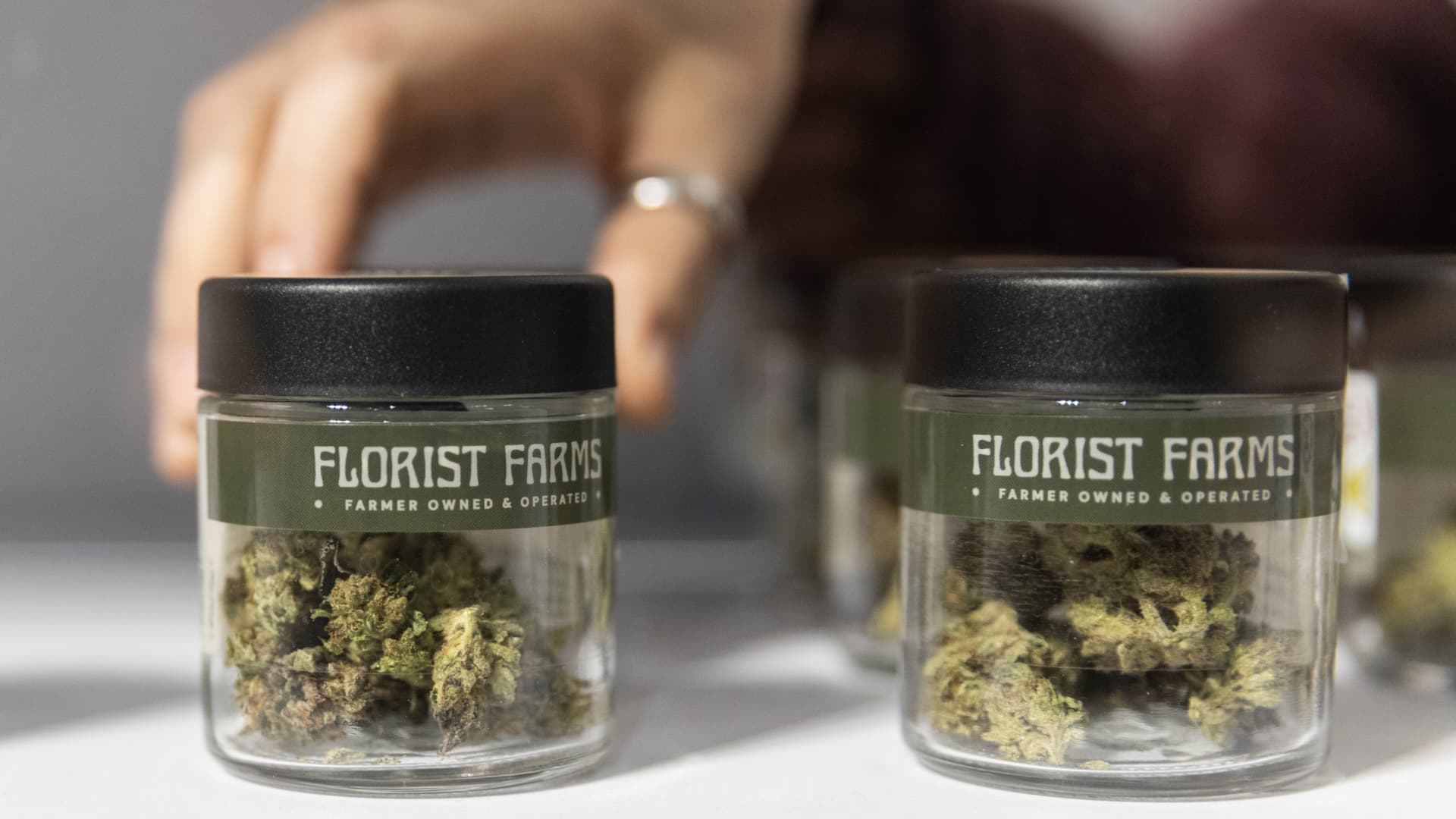A worker sets up Florist Farms cannabis products on the first day of legal recreational marijuana sales at the Housing Works Cannabis Co. in New York, on Thursday, Dec. 29, 2022.
Jeenah Moon | Bloomberg | Getty Images
This week, the Department of Health and Human Services has requested that the Drug Enforcement Agency (DEA) review the classification of marijuana under the Controlled Substances Act and potentially ease restrictions on its use.
This could serve as a significant catalyst for the cannabis industry, which has been constrained by federal regulations despite the increasing legalization at the state level.
Following the news, marijuana stocks such as Aurora Cannabis, Canopy Growth, and Tilray Brands experienced a surge in value. These stocks continued to rise on Thursday.
Since the 1970s, marijuana has been categorized as a Schedule I drug, alongside heroin and LSD, indicating that it has no accepted medical use and a high potential for abuse. Despite favorable scientific research and state laws supporting its medicinal properties, marijuana has remained in this category, ranking higher than fentanyl, cocaine, and methamphetamine.
The DEA will now consider reclassifying marijuana as a Schedule III drug, putting it in the same category as substances like ketamine, anabolic steroids, and testosterone. Schedule III drugs are considered to have a moderate to low potential for physical or psychological dependence. It is important to note that this recommendation will not fully remove marijuana from the controlled substances list, and its cultivation, production, and sales will still be illegal under federal law. Currently, marijuana is medically legal in 39 states and recreationally legal in 23 states.
What’s next for marijuana policy?
As part of the recommendation process, the Department of Health and Human Services conducted a scientific and medical evaluation to inform the final decision on marijuana’s classification.
An analyst from Roth MKM predicts that a decision will likely be made before the 2024 presidential election, noting that historically, the DEA has followed the recommendations of the HHS in scheduling matters.
The DEA will assess marijuana’s potential for abuse, medical use, and level of danger to determine whether it should be reclassified. With the existence of medical marijuana programs in nearly 40 states, upholding the Schedule I classification based on its potential for medical use may prove difficult.
Once the DEA reaches a decision, it will submit a proposal to the attorney general for the final ruling.
What does it mean for the cannabis industry?
If marijuana is reclassified as a Schedule III substance, it will significantly reduce the restrictions that have hindered the industry.
One major benefit will be the ability for cannabis businesses to take advantage of tax deductions. Currently, enterprises dealing with Schedule I substances are not eligible to write off their expenses on federal tax returns due to IRS code 280E. This has been a challenge for many cultivators, processors, and retailers, especially as the industry experiences a slowdown in sales.
“The removal of 280E will have a widespread material impact on the financial performance of every company in the industry, large and small, public and private,” said Jeff Schultz, a marijuana attorney at Foley Hoag.

Furthermore, reclassification will allow for interstate commerce, addressing the issue of transporting marijuana across state lines, which is currently illegal. This change will open up new market opportunities and potentially alleviate oversupply in certain states.
The rescheduling of marijuana will also promote further research in the sector, attract investors during a period of capital shortage, and potentially increase the value of publicly traded marijuana stocks.
However, banking services for the industry will still not be fully available due to federal laws, as Schedule III drugs still present a risk for financial institutions. The Secure and Fair Enforcement (SAFE) Banking Act, currently being considered by Congress, aims to address this issue.
Is federal marijuana legalization imminent?
Senate Majority Leader Chuck Schumer expressed his support for the industry, stating that while reclassification is a step forward, the ultimate goal is to end federal prohibition on marijuana.
“HHS has done the right thing and DEA should now quickly follow through on this important step to greatly reduce the harm caused by draconian marijuana laws,” said Schumer in a statement on Thursday. “There is still much more that needs to be done legislatively to end the federal prohibition on cannabis and roll back the War on Drugs.”
Similarly, industry executives believe that federal cannabis reform is overdue and that this development brings the industry closer to the Biden administration declaring an end to the war on cannabis.
Denial of responsibility! VigourTimes is an automatic aggregator of Global media. In each content, the hyperlink to the primary source is specified. All trademarks belong to their rightful owners, and all materials to their authors. For any complaint, please reach us at – [email protected]. We will take necessary action within 24 hours.


